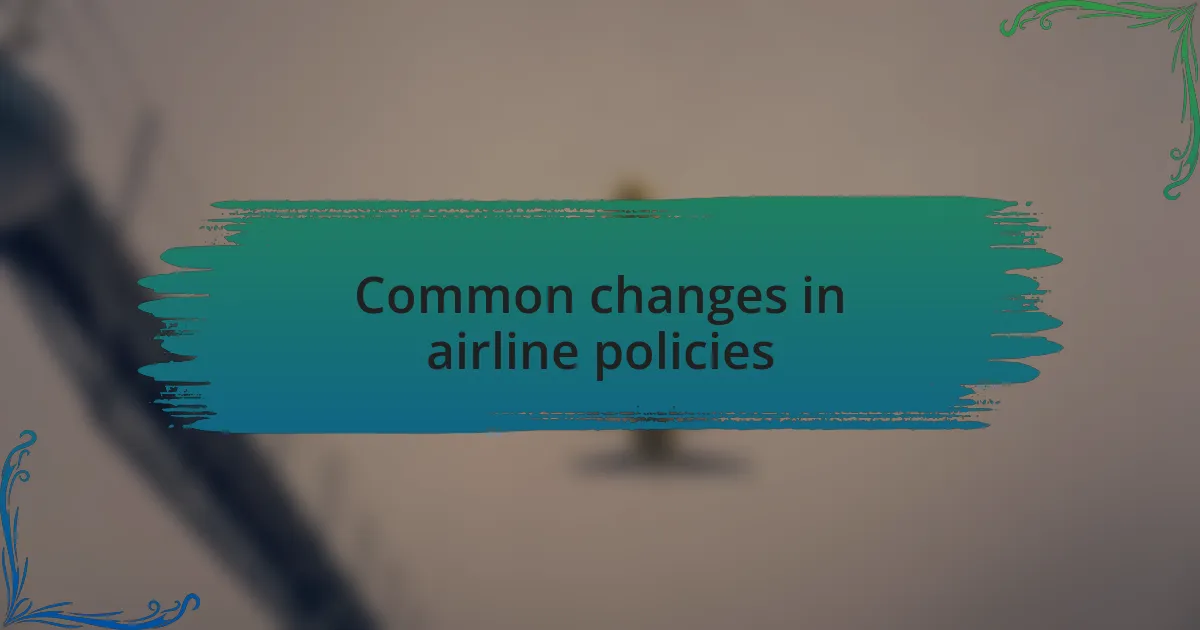Key takeaways:
- Understanding Thai Airways policies regarding baggage, cancellations, and refunds is crucial for a stress-free experience.
- Adapting to changes in airline policies, particularly regarding health measures and fees, requires staying informed and proactive.
- Personal experiences with Thai Airways highlight the importance of attentive service, clear communication, and engaging in-flight entertainment.
- Embracing flexibility and asking questions can significantly enhance travel experiences and alleviate confusion regarding new policies.

Understanding Thai Airways policies
When I first started flying with Thai Airways, I was surprised by how comprehensive their policies were. For instance, the baggage allowance seemed generous, but I quickly learned to double-check the latest guidelines. Have you ever felt that moment of uncertainty at the check-in desk? I certainly have.
Understanding their policies about cancellations and refunds was initially daunting, but it was a good lesson in traveler rights. I once had to change my itinerary unexpectedly, and navigating through their regulations gave me a sense of empowerment. It made me realize that being informed can transform a potentially stressful situation into a manageable one.
I particularly appreciated how Thai Airways provides detailed explanations for their policies on their website. It felt reassuring to have access to clear, direct information, especially when flying internationally. Have you ever wished travel guidelines were more straightforward? I know I did, and finally grasping the nuances took away a lot of my travel anxiety.

Common changes in airline policies
Changes in airline policies are almost inevitable, and I’ve observed this firsthand with my experiences flying. For example, recent shifts toward stricter baggage policies can be frustrating. The moment I showed up at the airport with one too many carry-ons, I felt that sinking feeling—a mix of panic and regret as I stood in line to pay the extra fees. Have you ever found yourself in a similar predicament?
Another common change I noticed is the growing focus on health and safety measures. After the pandemic, I was pleasantly surprised by how Thai Airways adapted quickly. They introduced enhanced cleaning protocols and modified boarding procedures to minimize contact. Experiencing these measures firsthand gave me a sense of security, as I imagined how other airlines were handling the situation. It was comforting to know that my safety was a priority, but I also wondered how long these changes would stick around.
Lastly, the introduction of flexible fare options has become a trend. I remember booking a flight last-minute without realizing that the fare was non-refundable until I tried to change it. It was a learning moment! Now, I tend to opt for more flexible booking options when possible. Isn’t it great when policies adapt to fit the unpredictable nature of travel?

Challenges faced with new policies
Embracing new airline policies can sometimes feel like navigating a minefield, especially when it comes to unexpected fees. I vividly recall a flight where I had to adjust my itinerary at the last minute due to a family emergency. The heartache of not only changing my plans but also discovering a hefty fee for the altered ticket nearly overshadowed the urgency of my situation. Have you ever felt the weight of those unanticipated costs looming over your travel plans?
Another challenge I’ve encountered relates to the ever-changing rules surrounding health and safety. While I appreciated the added precautions, I found the inconsistency across different flights puzzling. During one trip, I was greeted with a rigorous temperature check, while on another, there was barely a glance at my health documentation. This inconsistency can be unsettling, prompting questions about the standard of care being provided. How do we balance personal health assurance with the complexities of travel?
Lastly, when airlines pivot their policies, it sometimes leaves us scrambling to stay informed. I remember booking an international trip only to discover that the change in baggage limits meant I was in dire need of a larger suitcase. Standing at the store, I felt frustration brewing—why wasn’t this communicated more clearly? I often wonder how many travelers have faced similar surprises, and it makes me wish for better communication from airlines. Doesn’t it seem like clearer guidelines could ease some of that travel stress?

Strategies for adapting to changes
When adapting to new airline policies, staying informed is essential. I remember the urgency of checking the Thai Airways website for updates weekly, especially after a change in boarding procedures. Have you ever felt that nagging uncertainty before a trip? It’s a small effort that pays off in peace of mind, allowing me to prepare without last-minute surprises.
Another strategy involves utilizing available resources. I often find it helpful to engage with customer service through social media. This direct interaction not only offers quick answers but also creates a sense of connection with the airline. How often have you wished for a more personable customer experience while grappling with confusing policies?
Additionally, I’ve learned to be proactive regarding exchanges and cancellations. In one instance, I had to shift my travel dates but did so only after understanding the fine print about fees. This experience taught me to read everything thoroughly. Doesn’t it feel empowering to take charge of your travel plans, even when faced with unexpected policy changes?

Personal experiences with Thai Airways
I’ve had the chance to travel with Thai Airways multiple times, and each experience has carved out unique memories. On one particularly memorable flight, I found the cabin crew to be exceptionally attentive, which made a long trip much more enjoyable. Have you ever been on a flight where the little things, like a warm smile or helpful attitude, turned your journey into a pleasant experience? That warmth can really set the tone for the whole trip.
One time, I encountered an unexpected flight delay, and I must admit, I initially felt frustrated. However, the way Thai Airways handled the situation left a lasting impression on me. The airline promptly communicated updates and offered meal vouchers, which made waiting at the airport a little more bearable. How often do we appreciate an airline for their transparency during inconvenient moments? That experience solidified my loyalty to them.
There was another occasion when I discovered their in-flight entertainment options were vast and engaging. I had a chance to watch a couple of films I’d missed at the theater, which turned a routine travel day into a mini escape. Does it surprise you how a good selection of movies can shift your mood on a long flight? It definitely worked for me and made the journey feel shorter and more enjoyable.

Tips for smooth transitions
When adapting to new airline policies, staying informed is crucial. I remember when Thai Airways updated their baggage allowance; at first, I was puzzled about how it would affect my packing strategy. A quick glance at the airline’s official website cleared up my confusion and helped me pack efficiently without the stress of exceeding the limits. How often do we jump to conclusions without checking the facts?
Another tip is to embrace flexibility with your travel plans. During a recent trip, I noticed certain in-flight services had changed. Instead of feeling put out, I decided to approach the situation with an open mind, which led me to discover new services that, frankly, enriched my travel experience. Have you ever realized that being adaptable can lead to delightful surprises?
Lastly, don’t hesitate to ask questions at the check-in counter or through customer service. I was once unsure about a policy regarding upgrades, so I asked a friendly staff member for clarification. Their willingness to assist made me feel valued and ensured I fully understood my options. Isn’t it amazing how a simple inquiry can enhance your travel experience?